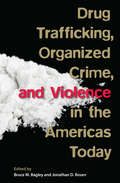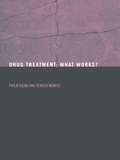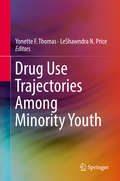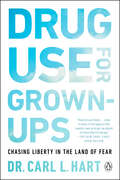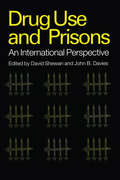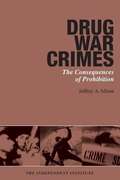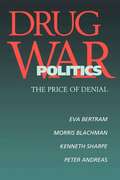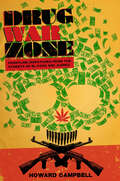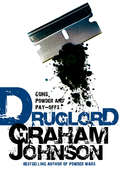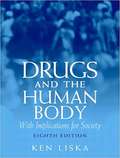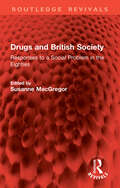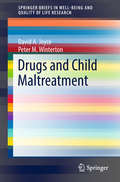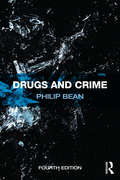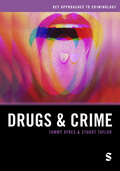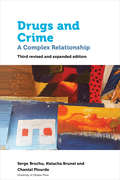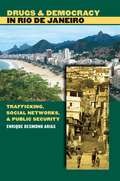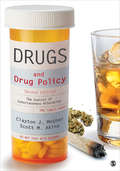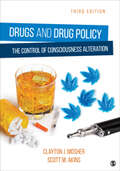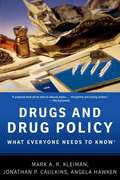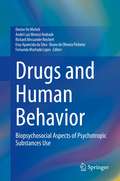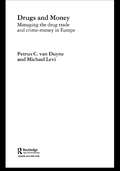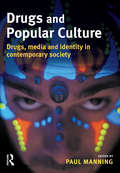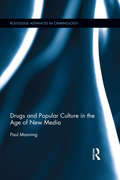- Table View
- List View
Drug Trafficking, Organized Crime, and Violence in the Americas Today
by Jonathan D. Rosen Bruce M. Bagley"An extensive overview of the drug trade in the Americas and its impact on politics, economics, and society throughout the region. . . . Highly recommended."--Choice "A first-rate update on the state of the long-fought hemispheric 'war on drugs.' It is particularly timely, as the perception that the war is lost and needs to be changed has never been stronger in Latin and North America."--Paul Gootenberg, author of Andean Cocaine: The Making of a Global Drug "A must-read volume for policy makers, concerned citizens, and students alike in the current search for new approaches to forty-year-old policies largely considered to have failed."--David Scott Palmer, coauthor of Power, Institutions, and Leadership in War and Peace "A very useful primer for anyone trying to keep up with the ever-evolving relationship between drug enforcement and drug trafficking."--Peter Andreas, author of Smuggler Nation: How Illicit Trade Made America In 1971, Richard Nixon declared a war on drugs. Despite foreign policy efforts and attempts to combat supply lines, the United States has been for decades, and remains today, the largest single consumer market for illicit drugs on the planet. This volume argues that the war on drugs has been ineffective at best and, at worst, has been highly detrimental to many countries. Leading experts in the fields of public health, political science, and national security analyze how U.S. policies have affected the internal dynamics of Mexico, Colombia, Bolivia, Peru, Brazil, Argentina, Central America, and the Caribbean islands. Together, they present a comprehensive overview of the major trends in drug trafficking and organized crime in the early twenty-first century. In addition, the editors and contributors identify emerging issues and propose several policy options to address them. This accessible and expansive volume provides a framework for understanding the limits and liabilities in the U.S.-championed war on drugs throughout the Americas.
Drug Treatment: What Works?
by Philip Bean Teresa NemitzBritain, like almost everywhere else, has a burgeoning drug problem. Finding ways of dealing with this problem is a major platform of government policy and a great deal has been made of the impact of treatment on drug users. Drug Treatment: What Works? is a cutting edge survey of the latest developments in these treatments, and it sets out to ask some of the crucial questions in the treatment of drug abusers; including:* Which treatments work with what sorts of abusers?* What are the key indicators of likely success?* Does coercion work or must treatment be freely entered into? * Is drug testing an essential backup for successful treatment?Featuring contributions from some the leading figures in this field, Drug Treatment: What Works? will be essential reading for students, academics and professionals studying drug treatment in the areas criminology, social policy and medicine.
Drug Use Trajectories Among Minority Youth
by Yonette F. Thomas Leshawndra N. PriceThis volume examines trajectories of drug use among ethnic minority youth in the United States with a focus on African Americans and Hispanics. It also highlights what research designs have been employed to address these differences as well as suggests strategies for moving this discourse forward by identifying potential targets for prevention and intervention with minority youth. This book features essays by leading experts in the field who have grappled with this issue for decades. Inside, readers will find an insightful dialogue that addresses such questions as: Why are African American and Hispanic youth more likely than their White peers to abstain from drug use during adolescence but are more likely to become problem users later in life? What impact does the stress caused by discrimination have on potential drug use? To what extent does religiosity protect minority youth from drug use as past research suggests that it protects White youth? What is the influence of neighborhood context on exposure to and use of substances among urban African American children? Taken together, the essays in this book identify underexplored risk and protective factors and gaps in the current state of knowledge that can be used to develop effective, culturally specific drug abuse prevention strategies. This book is for anyone with an interest in the initiation and escalation of drug use among African Americans and Hispanics/Latinos and factors that influence these patterns over the life course. It will also be an ideal resource for those interested in better understanding the mechanisms by which risk and protective factors are related to the development of drug use and addiction, particularly the ways in which such factors contribute to health differences and have disproportionately more negative consequences for ethnic minorities.
Drug Use for Grown-Ups: Chasing Liberty in the Land of Fear
by Dr. Carl L. HartFrom one of the world's foremost experts on the subject, a powerful argument that the greatest damage from drugs flows from their being illegal, and a hopeful reckoning with the possibility of their use as part of a responsible and happy lifeDr. Carl L. Hart, Ziff Professor at Columbia University and former chair of the Department of Psychology, is one of the world's preeminent experts on the effects of so-called recreational drugs on the human mind and body. Dr. Hart is open about the fact that he uses drugs himself, in a happy balance with the rest of his full and productive life as a colleague, husband, father, and friend. In Drug Use for Grown-Ups, he draws on decades of research and his own personal experience to argue definitively that the criminalization and demonization of drug use--not drugs themselves--have been a tremendous scourge on America, not least in reinforcing this country's enduring structural racism.Dr. Hart did not always have this view. He came of age in one of Miami's most troubled neighborhoods at a time when many ills were being laid at the door of crack cocaine. His initial work as a researcher was aimed at proving that drug use caused bad outcomes. But one problem kept cropping up: the evidence from his research did not support his hypothesis. From inside the massively well-funded research arm of the American war on drugs, he saw how the facts did not support the ideology. The truth was dismissed and distorted in order to keep fear and outrage stoked, the funds rolling in, and Black and brown bodies behind bars. Drug Use for Grown-Ups will be controversial, to be sure: the propaganda war, Dr. Hart argues, has been tremendously effective. Imagine if the only subject of any discussion about driving automobiles was fatal car crashes. Drug Use for Grown-Ups offers a radically different vision: when used responsibly, drugs can enrich and enhance our lives. We have a long way to go, but the vital conversation this book will generate is an extraordinarily important step.
Drug Use in Prisons (Scottish Prison Service Occasional Paper Ser.)
by ShewanFirst Published in 2000. Routledge is an imprint of Taylor & Francis, an informa company.
Drug War Crimes: The Consequences of Prohibition
by Jeffrey MironA balanced and sophisticated analysis of the true costs, benefits, and consequences of enforcing drug prohibition is presented in this book. Miron argues that prohibition's effects on drug use have been modest and that prohibition has numerous side effects, most of them highly undesirable. In particular, prohibition is shown to directly increase violent crime, even in cases where it deters drug use. Miron's analysis leads to a disturbing finding—the more resources given to the fight against drugs, the greater the homicide rate. The costs and benefits of several alternatives to the war on drugs are examined. The conclusion is unequivocal and states that any of the most widely discussed alternatives is likely to be a substantial improvement over current policy.
Drug War Politics: The Price Of Denial (Emersion: Emergent Village Resources For Communities Of Faith Ser.)
by Peter Andreas Kenneth Sharpe Eva Bertram Morris BlachmanWhy have our drug wars failed and how might we turn things around? Ask the authors of this hardhitting exposè of U.S. efforts to fight drug trafficking and abuse. In a bold analysis of a century's worth of policy failure, Drug War Politics turns on its head many familiar bromides about drug politics. It demonstrates how, instead of learning from our failures, we duplicate and reinforce them in the same flawed policies. The authors examine the "politics of denial" that has led to this catastrophic predicament and propose a basis for a realistic and desperately needed solution. Domestic and foreign drug wars have consistently fallen short because they are based on a flawed model of force and punishment, the authors show. The failure of these misguided solutions has led to harsher get-tough policies, debilitating cycles of more force and punishment, and a drug problem that continues to escalate. On the foreign policy front, billions of dollars have been wasted, corruption has mushroomed, and human rights undermined in Latin America and across the globe. Yet cheap drugs still flow abundantly across our borders. At home, more money than ever is spent on law enforcement, and an unprecedented number of people―disproportionately minorities―are incarcerated. But drug abuse and addiction persist. The authors outline the political struggles that help create and sustain the current punitive approach. They probe the workings of Washington politics, demonstrating how presidential and congressional "out-toughing" tactics create a logic of escalation while the criticisms and alternatives of reformers are sidelined or silenced. Critical of both the punitive model and the legalization approach, Drug War Politics calls for a bold new public health approach, one that frames the drug problem as a public health―not a criminal―concern. The authors argue that only by situating drug issues in the context of our fundamental institutions―the family, neighborhoods, and schools―can we hope to provide viable treatment, prevention, and law enforcement. In its comprehensive investigation of our long, futile battle with drugs and its original argument for fundamental change, this book is essential for every concerned citizen.
Drug War Zone: Frontline Dispatches from the Streets of El Paso and Juárez (The William & Bettye Nowlin Series in Art, History, and Culture of the Western Hemisphere)
by Howard CampbellThousands of people die in drug-related violence every year in Mexico. Ciudad Juárez, Chihuahua, adjacent to El Paso, Texas, has become the most violent city in the Mexican drug war. Much of the cocaine, marijuana, and methamphetamine consumed in the United States is imported across the Mexican border, making El Paso/Juárez one of the major drug-trafficking venues in the world. In this anthropological study of drug trafficking and anti-drug law enforcement efforts on the U. S. -Mexico border, Howard Campbell uses an ethnographic perspective to chronicle the recent Mexican drug war, focusing especially on people and events in the El Paso/Juárez area. It is the first social science study of the violent drug war that is tearing Mexico apart. Based on deep access to the drug-smuggling world, this study presents the drug war through the eyes and lives of direct participants. Half of the book consists of oral histories from drug traffickers, and the other half from law enforcement officials. There is much journalistic coverage of the drug war, but very seldom are the lived experiences of traffickers and "narcs" presented in such vivid detail. In addition to providing an up-close, personal view of the drug-trafficking world, Campbell explains and analyzes the functioning of drug cartels, the corruption that facilitates drug trafficking, the strategies of smugglers and anti-narcotics officials, and the perilous culture of drug trafficking that Campbell refers to as the "Drug War Zone. "
Druglord: Guns, Powder and Pay-Offs
by Graham JohnsonWhen ruthless drug baron John Haase was sentenced to 18 years' imprisonment for heroin-trafficking in 1995, it was a major victory for Customs and the police. But in a shock move, after Haase and his partner Paul Bennett had served only 11 months, then Home Secretary Michael Howard signed a Royal Pardon for their release. Howard defended his decision by revealing that Haase and Bennett had become invaluable informants. But Haase had in fact duped the authorities, and far from being forced into hiding as a supergrass, he gained new kudos among the criminal underworld for beating the system so audaciously. Graham Johnson interviewed Haase at Whitemoor prison and has obtained a copy of his sworn affidavit revealing the truth behind the Royal Pardon scandal. Allegations of huge bribes, mass fabrication of evidence and dark powers at the heart of the justice system make this an explosive exposé of Britain's number-one drug kingpin.
Drugs And The Human Body
by Ken LiskaClear and readable for the average reader – yet comprehensive enough for the professional – this reliable reference addresses the effects of high-use, high-abuse drugs in America in a timely and straightforward fashion. Reflects up-to-date research throughout, including coverage of street, over-the-counter, and prescriptive drugs. Highlights the World Wide Web as a growing primary source of drug information. Extensively revises coverage of drug discovery, including major additional information on proteomics, and pharmacogenomics; and highlights the importance of these topics in the context of personalized drug treatment. For professionals in health and drug education, criminal justice, sociology, biology, and chemistry.
Drugs and British Society: Responses to a Social Problem in the Eighties (Routledge Revivals)
by Susanne MacGregorFirst published in 1989, Drugs and British Society (now with a new preface by Susanne MacGregor) provides information on the drugs problem in Britain in the 1980s, based on extensive research and experience, and places it in its international and historical context.The contributors to this book are all experts in this field, and are drawn from a range of disciplines, including epidemiology, sociology, social psychiatry, social policy, anthropology, and history. They share a social rather than a narrowly medical or individualistic perspective on drugs, stressing that policy and practice about drugs must be based not on prejudice, alarm or outdated ideas, but on clear, reliable and detailed evidence and the informed judgements of people who have a thorough understanding of the issues. They explain the problem by referring it to its social and political context, from the level of the local community and local services to the wider national and structural levels.
Drugs and Child Maltreatment (SpringerBriefs in Well-Being and Quality of Life Research)
by David A. Joyce Peter M. WintertonThis book combines experience in child protection with expertise in clinical pharmacology and forensic toxicology, to set out a broad contemporary understanding of child maltreatment with drugs. It explores presentations that range through ante-natal exposure, factitious illness, deliberate poisoning, drug accidents while in the care of drug-affected adults, misuse of therapeutic drugs and the drug-related death of a child. It describes how to recognise where deliberate drug exposure or perversion of proper therapeutics is being used to harm a child, how to use laboratory testing to confirm a diagnosis, how to combine medical and social care with the need to gather legal evidence and how to deploy social, medical and legal resources for child protection. The roles of the forensic toxicologist and contemporary forensic laboratory methods in resolving cryptic presentations are discussed in each context. There is guidance on effective communication about drugs within the child protection team and on writing reports for legal purposes, on the way to returning the child to safety. The book also explores the particular difficulties that arise in reconciling parents' rights and cultural beliefs with the obligation to document a child’s drug exposure and in dealing with parents and carers who themselves may be drug-impaired.
Drugs and Crime
by Philip BeanA high proportion of crimes committed in Britain are drugs-related, with many offenders having a documented history of drug use. However, the direct link between drugs and crime is often less clear than is supposed and this text attempts to achieve a better understanding of these and surrounding issues that have been marred by misunderstanding and a lack of consensus amongst experts. This text offers a major contribution to existing debates and provides an authoritative and much-needed overview of the range of issues associated with drugs-related crime. Coverage includes: a discussion on theoretical approaches to drugs and crime, an overview of the legal position on drugs and drug offenders, a critique of the aims and nature of treatment, an examination of trafficking and laundering, an analysis of the policing of drugs markets, a discussion about the legalisation debates. This new edition has been fully updated to include the latest data and recent developments in policy and particular attention is paid to changes in sentencing and treatment, as well as changes to practice in trafficking. An expanded chapter on women, drugs and crime now offers further coverage of drug-taking and prostitution. This is the only book in Britain which centres on the links between drugs and crime, and deals with the policy implications of that link. It is a comprehensive account of the various aspects of Government policy concerning drugs, and should be particularly useful to academics and students interested in or studying this aspect of criminology.
Drugs and Crime (Key Approaches to Criminology)
by Stuart Taylor Tammy AyresThe relationship between drugs and crime is well-established, yet far more nuanced and complex than we might think. This fresh, critical text unites key themes like media, ethnicity, race, gender and sexuality to explore radical new perspectives. In this book you will encounter: - The misconceptions surrounding drug use and its association with criminal activity - Contemporary topics, from the US opioid crisis to technical advancements in drug distribution - An analysis of the inequalities inherent in criminal justice for minority ethnic and socioeconomically disadvantaged groups - Global case studies, from Portugal to Canada to Uruguay Looking to challenge your understanding of drugs and crime? Whether you are a student, academic or practitioner, this text will radically transform your understanding and ignite your critical thinking.
Drugs and Crime (Key Approaches to Criminology)
by Stuart Taylor Tammy AyresThe relationship between drugs and crime is well-established, yet far more nuanced and complex than we might think. This fresh, critical text unites key themes like media, ethnicity, race, gender and sexuality to explore radical new perspectives. In this book you will encounter: - The misconceptions surrounding drug use and its association with criminal activity - Contemporary topics, from the US opioid crisis to technical advancements in drug distribution - An analysis of the inequalities inherent in criminal justice for minority ethnic and socioeconomically disadvantaged groups - Global case studies, from Portugal to Canada to Uruguay Looking to challenge your understanding of drugs and crime? Whether you are a student, academic or practitioner, this text will radically transform your understanding and ignite your critical thinking.
Drugs and Crime: A Complex Relationship. Third revised and expanded edition (Health and Society)
by Serge Brochu Natacha Brunelle Chantal PlourdeDiscussing illegal drugs without taking into account its criminal context is a difficult proposition. Certain questions come back repeatedly: Does doing drugs really lead to delinquency? Do some drugs have criminal properties? Why would a drug addict turn to crime? What are the best methods of intervention in dealing with individuals who have serious drug habits? The third edition of Drogue et criminalité : Une relation complexe (Les Presses de l’Université de Montréal), translated here for the first time in English, presents an overview of the complex relationship between drugs and crime, avoids cursory affirmations to the effect that psychoactive substance use necessarily leads to crime. It also sheds light on the political and legislative contexts tied to drugs and offers an exceptional synthesis of the research literature of the past 20 years. The authors also discuss the increased attention to illegal drug users and people with addictions, and describe the different supports that are available to them. This book is published in English. - Concevoir la question des drogues illicites en dehors de leur contexte criminel est difficile. Certaines questions reviennent immanquablement : prendre de la drogue pousse-t-il vraiment à la délinquance ? Existe-t-il des drogues aux propriétés criminogènes ? Pourquoi un toxicomane se tourne-t-il vers la criminalité ? Quelles sont les meilleures façons d’intervenir auprès des personnes qui ont de graves problèmes de consommation ? Cette troisième édition présente la relation complexe entre drogue et criminalité, évitant les énoncés sommaires qui voudraient que l’usage de substances psychoactives mène nécessairement au crime. Elle met ainsi en lumière les contextes politiques et légaux liés aux drogues et fait une synthèse exceptionnelle des résultats de la recherche des vingt dernières années. Les auteurs rendent compte de l’importance accrue qu’on accorde désormais aux usagers de drogues illicites ainsi qu’aux personnes dépendantes et ils décrivent les différentes formes d’aide qui leur sont proposées. Ce livre est publié en anglais.
Drugs and Democracy in Rio de Janeiro
by Enrique Desmond AriasTaking an ethnographic approach to understanding urban violence, Enrique Desmond Arias examines the ongoing problems of crime and police corruption that have led to widespread misery and human rights violations in many of Latin America's new democracies. Employing participant observation and interview research in three favelas (shantytowns) in Rio de Janeiro over a nine-year period, Arias closely considers the social interactions and criminal networks that are at the heart of the challenges to democratic governance in urban Brazil. Much of the violence is the result of highly organized, politically connected drug dealers feeding off of the global cocaine market. Rising crime prompts repressive police tactics, and corruption runs deep in state structures. The rich move to walled communities, and the poor are caught between the criminals and often corrupt officials. Arias argues that public policy change is not enough to stop the vicious cycle of crime and corruption. The challenge, he suggests, is to build new social networks committed to controlling violence locally. Arias also offers comparative insights that apply this analysis to other cities in Brazil and throughout Latin America.
Drugs and Drug Policy: The Control of Consciousness Alteration
by Dr Clayton Mosher Scott AkinsDrugs and Drug Policy, Second Edition provides a cross-national perspective on the use and regulation of both legal and illegal drugs. This engaging text examines and critiques drug policies in the United States and abroad in terms of their scope, goals, and effectiveness. Authors Clayton J. Mosher and Scott Akins also discuss the physiological, psychological, and behavioral effects of legal and illicit drugs; the patterns and correlates of use; and theories of the “causes” of drug use.
Drugs and Drug Policy: The Control of Consciousness Alteration
by Scott Akins Dr. Clayton MosherThis engaging and thoroughly updated text provides a cross-national perspective on the use and regulation of both legal and illegal drugs. Drugs and Drug Policy examines and critiques drug policies in the United States and abroad in terms of their scope, goals, and effectiveness. Authors Clayton J. Mosher and Scott Akins also discuss the physiological, psychological, and behavioral effects of legal and illicit drugs; the patterns and correlates of use; theories of the causes of drug use; and the policies that govern that usage.
Drugs and Drug Policy: The Control of Consciousness Alteration
by Scott Akins Dr. Clayton MosherThis engaging and thoroughly updated text provides a cross-national perspective on the use and regulation of both legal and illegal drugs. Drugs and Drug Policy examines and critiques drug policies in the United States and abroad in terms of their scope, goals, and effectiveness. Authors Clayton J. Mosher and Scott Akins also discuss the physiological, psychological, and behavioral effects of legal and illicit drugs; the patterns and correlates of use; theories of the causes of drug use; and the policies that govern that usage.
Drugs and Drug Policy: What Everyone Needs to Know
by Mark A. R. Kleiman Jonathan P. Caulkins Angela HawkenWhile there have always been norms and customs around the use of drugs, explicit public policies - regulations, taxes, and prohibitions - designed to control drug abuse are a more recent phenomenon. Those policies sometimes have terrible side-effects: most prominently the development ofcriminal enterprises dealing in forbidden (or untaxed) drugs and the use of the profits of drug-dealing to finance insurgency and terrorism. Neither a drug-free world nor a world of free drugs seems to be on offer, leaving citizens and officials to face the age-old problem: What are we going to do about drugs? In Drugs and Drug Policy, three noted authorities survey the subject with exceptional clarity, in this addition to the acclaimed series, What Everyone Needs to Know. They begin by, defining "drugs," examining how they work in the brain, discussing the nature of addiction, and exploring the damage they do to users. The book moves on to policy, answering questions about legalization, the role of criminal prohibitions, and the relative legal tolerance for alcohol and tobacco. The authors then dissect the illicit trade, from street dealers to the flow of money to the effect of catching kingpins,and show the precise nature of the relationship between drugs and crime. They examine treatment, both its effectiveness and the role of public policy, and discuss the beneficial effects of some abusable substances. Finally they move outward to look at the role of drugs in our foreign policy, their relationship to terrorism, and the ugly politics that surround the issue. Crisp, clear, and comprehensive, this is a handy and up-to-date overview of one of the most pressing topics in today's world.
Drugs and Human Behavior: Biopsychosocial Aspects of Psychotropic Substances Use
by André Luiz Monezi Andrade Eroy Aparecida da Silva Denise De Micheli Fernanda Machado Lopes Bruno de Oliveira Pinheiro Richard Alecsander ReichertThis book presents the main concepts and tools for the adoption of a biopsychosocial approach to psychotropic substances use and abuse management, prevention and treatment. It aims to provide resources for the design and implementation of health strategies and public policies to deal with psychotropic substances use in a way that fully recognizes the complex articulations between its biological, psychological and social aspects, taking these three dimensions into account to develop both health and social care policies and strategies aimed at psychotropic substance users. The book is organized in five parts. Part one presents a historical overview of psychotropic substances use throughout human history and introduces key concepts to understand the phenomenon from a biopsychosocial perspective. The next three parts approach psychotropic substances use from one of the interrelated dimensions of the biopsychosocial perspective: part two focuses on the neurobiological aspects; part three, on the psychological aspects; and part four, on the social aspects and its implications for public policy design. Finally, a fifth part is dedicated to special topics related to psychotropic substances use. Drugs and Human Behavior: Biopsychosocial Aspects of Psychotropic Substances Use is a guide to public agents, health professionals and social workers interested in adopting the biopsychosocial perspective to develop and implement both health and social care strategies and policies based on an interdisciplinary approach and aimed at dealing with psychotropic substance users in a more humanized way.
Drugs and Money: Managing the Drug Trade and Crime Money in Europe
by Michael Levi Petrus C. van DuyneThe phenomenon of psycho-active drugs, and our reactions to them, is one of the most fascinating topics of the social history of mankind. Starting with an analysis of the 'policy of fear' in which law enforcement is 'haunted' by drug money, Drugs and Money offers a radical reconsideration of this highly contentious issue.In this intriguing book, Petrus C. van Duyne and Michael Levi expose an ever-unfolding series of problems: the proliferation of mind-influencing substances the complications of international drug regulation the interaction between markets and economic actors, with the consequent amassing of huge amounts of crime-money. The social, cultural and economic aspects of this crime-money are explored, alongside the ongoing threat it poses to the legitimate economy and the state.
Drugs and Popular Culture
by Paul ManningThe use of illegal drugs is so common that a number of commentators now refer to the 'normalisation' of drug consumption. It is surprising, then, that to date very little academic work has explored drug use as part of contemporary popular culture. This collection of readings will apply an innovatory, multi-disciplinary approach to this theme, combining some of the most recent research on 'the normalisation thesis' with fresh work on the relationship between drug use and popular culture. In drawing upon criminological, sociological and cultural studies approaches, this book will make an important contribution to the newly emerging field positioned at the intersection of these disciplines. The particular focus of the book is upon drug consumption as popular culture. It aims to provide an accessible collection of chapters and readings that will explore drug use in popular culture in a way that is relevant to undergraduates and postgraduates studying a variety of courses, including criminology, sociology, media studies, health care and social work.
Drugs and Popular Culture in the Age of New Media: Drugs And Popular Culture In The Age Of New Media (Routledge Advances in Criminology #15)
by Paul ManningThis book examines the history of popular drug cultures and mediated drug education, and the ways in which new media - including social networking and video file-sharing sites - transform the symbolic framework in which drugs and drug culture are represented. Tracing the emergence of formal drug regulation in both the US and the United Kingdom from the late nineteenth century, it argues that mass communication technologies were intimately connected to these "control regimes" from the very beginning. Manning includes original archive research revealing official fears about the use of such mass communication technologies in Britain. The second half of the book assesses on-line popular drug culture, considering the impact, the problematic attempts by drug agencies in the US and the United Kingdom to harness new media, and the implications of the emergence of many thousands of unofficial drug-related sites.
